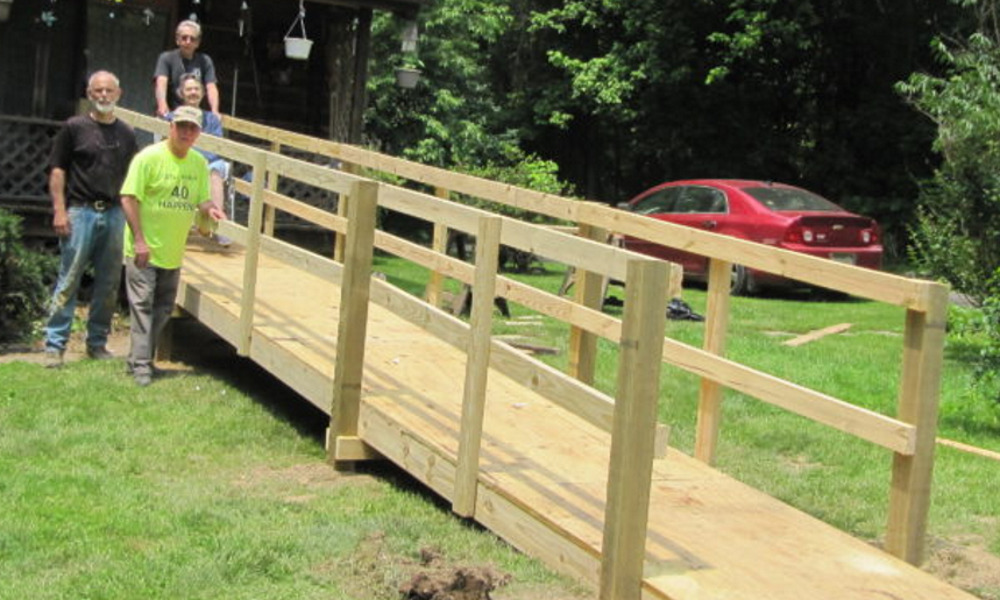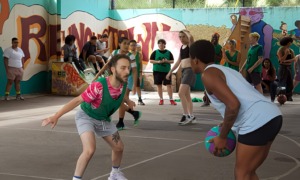The 130 volunteers of Good Shepherd Interfaith Volunteer Caregivers in Shepherdstown, W. Va., transport people to medical appointments, build ramps for wheelchair-users whose homes lack them, grocery-shop for those who are homebound and, generally, make life more livable for elderly and disabled residents in their area.
“Our mission is to help raise the quality of their lives and help give them the things that maybe others can have, but, for whatever reason, they’re not able to access,” said Paula Reese-Marrone, Good Shepherd’s CEO. “So it’s almost like helping level the playing field.”
 One of dozens of initial grantees in a roughly $5 million federal pilot program, begun in 2019, Good Shepherd is part of an aimed-for, Peace Corps-style network of volunteer caregivers for elderly and disabled people across the country. From that pot of National Volunteer Care Corps dollars, Good Shepherd, which has an annual budget of about $180,000 a year, received $45,000 last year.
One of dozens of initial grantees in a roughly $5 million federal pilot program, begun in 2019, Good Shepherd is part of an aimed-for, Peace Corps-style network of volunteer caregivers for elderly and disabled people across the country. From that pot of National Volunteer Care Corps dollars, Good Shepherd, which has an annual budget of about $180,000 a year, received $45,000 last year.
Sara Paige, the program manager for the Oasis Institute in St. Louis, which administers the grants, said the 23 grantees used 1,897 volunteers to provide services to more than 8,000 people last year. Though most of the beneficiaries, so far, have been elderly people, Paige said the grantees are all “open to the opportunity of serving younger disabled folks.” (Good Shepherd, for one, already is assisting disabled youth or young adults.)
The Oasis Institute would also like to expand the caregiving program beyond its current 20 states.
“What we don’t have at this point in time is a consistent reach across the country,” Paige said. “What we’re hoping is to be able to get the word out about the programs that we have. And, ultimately, the goal is we will choose … a number of programs that we are offering that are outstanding in their implementation that can be replicated across the country.”
The National Volunteer Care Corps’ overall funding is tiny compared to the Peace Corps’ annual appropriation of about $400 million. Even so, Reese-Marrone said her West Virginia organization’s small piece of the national care corps’ pie has made a big difference. She and her only other full-time staffer — Good Shepherd has a third staffer, though that position is unfilled right now — now are able to spend less time fundraising and more time hunting down supplies, vetting volunteers and connecting them with people in need. The grant has also provided more training.
“It just allows us to function better and to be able to help others,” Reese-Marrone said. “I would say we’ve tripled our capacity to be able to help others with having this grant.”
The volunteer helpers aren’t intended as replacements for paid caregivers
Oasis Institute president Paul Weiss said it’s important for people to understand that the National Volunteer Care Corps is not meant to fill the large and growing shortage of paid caregivers who can provide clinical nursing services, such as help with breathing tubes or wound care.
It’s meant to supplement those services with volunteers who can transport, shop and provide other non-clinical help, as well as respite for family caregivers, especially those who are struggling financially.
“There is a massive need to pay caregivers well and to recruit caregivers to work in clinical settings. This does not replace that,” Weiss said. “This is the discovery of community-based volunteer models to support low-income caregivers in ways that are not covered” by Medicaid, the government-funded health insurance for low-income people, or other supplementary health programs.
Weiss said the current pandemic has exposed just how difficult life can be for family caregivers, many of whom have lost jobs, in-person schooling for their disabled children and other in-home help.
“We got a real window into the amplification of how hard their situation is in a COVID-19 world,” Weiss said. “We feel humbled, and we feel a responsibility. This year it could not have been harder for low-income caregivers to get what they need to be successful because everything was harder for the demographic this project set out to serve during the pandemic.”
Paige said some of the Oasis Institute’s grantees had to pivot during the pandemic, changing some in-person services to phone or virtual help, and focusing on exterior home repairs rather than entering people’s homes.
The pandemic also has yielded new opportunities to serve. Grantees have enlisted volunteers to help elderly and disabled people schedule COVID-19 vaccinations online and promptly drive them to vaccine appointments.
Calls for caregiving assistance have risen significantly during COVID-19
Reese-Marrone said her organization’s grant could not have come at a better time, given the challenges COVID-19 presented. She said calls to Good Shepherd from people seeking help have risen steadily during the pandemic, and the nonprofit is fielding about 50 a week.
The grant has allowed Good Shepherd to continue recruiting volunteers to do things like find and deliver a motorized wheelchair for a disabled high school student, install a stair lift for a young father who injured his back and widen a bathroom doorway for a disabled child who had gotten too heavy for his mother to lift.
The organization recently found out that it will be getting another caregiving grant after the current one runs out, this time for $40,000.
“To get something two years in a row like this has given us the ability to take a look at ourselves and say, ‘Where do we need to improve? What areas could help us deliver even more service?’” Reese-Marrone said. “It’s been a godsend. It’s been absolutely a godsend.”






























